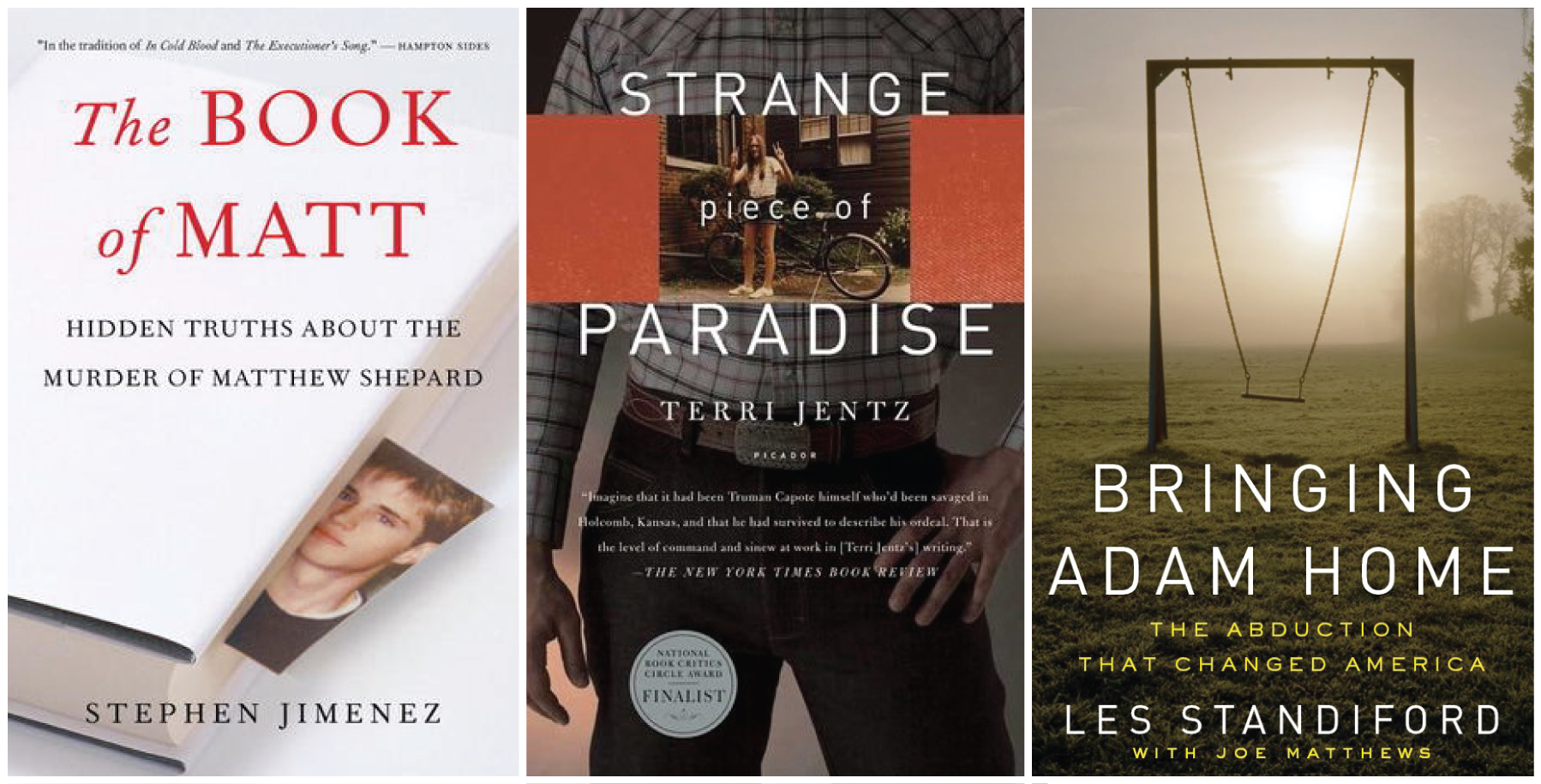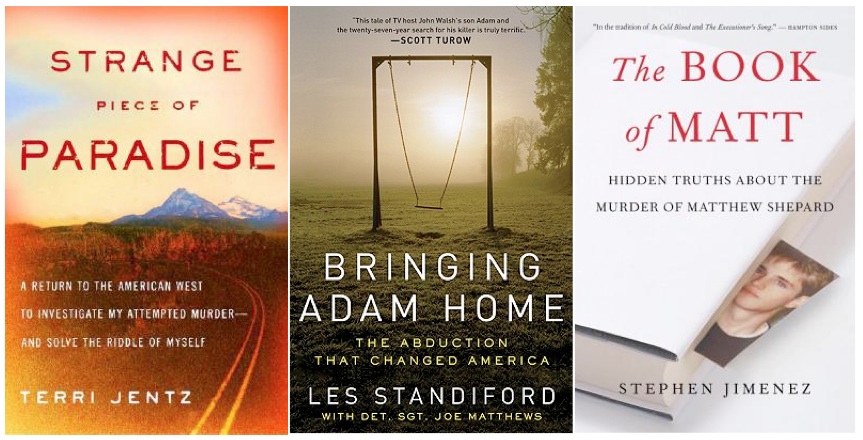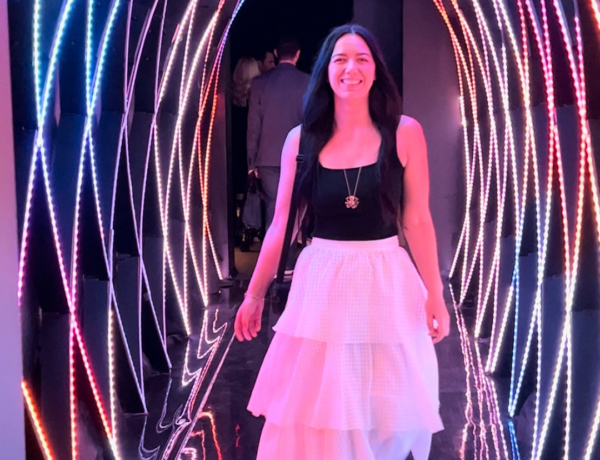“In Western culture, pretty much everything is understood through the process of storytelling, often to the detriment of reality.”
– Chuck Klosterman
Until she died at age ninety-two (or ninety-four, depending on whether you believe the St. Regis Akwesasne birth certificate or the New York State birth certificate), my Tota read five True Crime titles in a week, prurient mass markets with titles like An American Nightmare and Lust Killer. She’d started when she turned eighty; it was her version of sudoku. I read one to see what the fuss was about, and I’d be lying if I said I was bored. I also felt like I needed a shower afterwards, but not because of the subject matter as much as what enjoying the book said about me.
Since then I’ve read a few literate True Crime books (and by literate let’s agree that we mean True Crime which doesn’t require a shower to wash away the self-loathing, more In Cold Blood than To Love and to Kill). Three of them featured one person investigating a crime more than a decade past – Terri Jentz’s Strange Piece of Paradise, Les Standiford and Joe Matthew’s Bringing Adam Home, and Stephen Jimenez’s The Book of Matt – where the larger story that got reported missed the truth underneath.

In 1977, Terri Jentz was on a cross-country bike trip with her college roommate. One night a pickup truck deliberately ran them over, and the driver got out and took a hatchet to both young women. Newspapers across the country reported the horrible murder attempt, but no one was ever arrested for it, let alone convicted. When Jentz returns to Cline Falls for closure fifteen years later (the statute of limitations has expired, so all she can hope for is personal satisfaction) she is shocked to discover that nearly everyone in town knows exactly who did it.

Before the heinous abduction and murder of six-year-old Adam Walsh in 1981, children could get home from school and be told “go outside and play.” Afterwards, parents changed how they approached child safety, we passed multiple pieces of legislation, and created organizations to help missing and abused children, all largely on the efforts of two private citizens – Adam Walsh’s parents, John and Reve. Yet despite being a case that changed our culture, the murder remained unsolved.
In poring over all the evidence of the Adam Walsh case, decorated Miami Beach homicide detective Joe Matthews finds that the evidence points to one man. There’s even a smoking gun – a particular picture among five roles of film which went undeveloped for twenty-five years – but what strikes me is what happens when Matthews re-interviews the friends and family members of people close to the case. Everyone mentions the same man, using the matter-of-fact, offhand tone the residents of Cline Falls used with Terri Jentz.
Oh, it’s this guy… didn’t you know? Everyone knows; I’m surprised you didn’t.

Much like Adam Walsh’s murder in 1981 became a cultural touchstone for child safety, the 1998 murder of Matthew Shepard is a touchstone for LGBTQ Rights. His callous beating and torment educated the country about hate crimes and gay bashing. His murder led to enactment of Anti-Hate Crime legislation and got us talking about the spectrum of homophobia – hateful remarks on one end, violent assault on the other, and how it was all related.
Unlike Jentz and Matthews, Stephen Jimenez wrote a book no one wanted him to write. Jimenez travelled to Laramie, Wyoming in 2000 looking to write a screenplay which honored Matthew Shepard’s life and death. Instead, after thirteen years of research, he wrote a book which contradicted the accepted narrative that Matthew Shepard was beaten to death for being gay. An openly-gay reporter, Jimenez has been called self-hating and egocentric. He’s been accused of shoddy-reporting, undermining the LGBTQ cause, and courting controversy to make money.
In Shepard’s case the killers are in jail, and if the original sentences stand then they will die there, so there’s no “whodunnit” involved. Instead, we have the tarnishing of a martyr. Shepard, traumatized by a gang rape while vacationing in Morocco, turned to drugs and risky sex. Aaron McKinney and Russell Henderson didn’t beat a stranger to death for being gay, they had an ongoing relationship with Shepard, and they beat him hoping to get their hands on a large quantity of methamphetamine.
When Stephen Jimenez came under attack, the very thing which his detractors latched on to was exactly what reminded me of Strange Piece of Paradise and Bringing Adam Home – no one could believe how many people casually came forward to talk about the relationship between Matthew and Aaron McKinney, or about Matthew’s drug use.
But that happens all the time in cases where the crime becomes a national sensation. Everyone wants the details of the story, the gorier the better, but no one cares about the truth.
We’re fascinated with True Crime. Unfortunately, our brains are wired to make processing information as easy as possible, which often means fitting complicated individuals into archetypes, turning inconceivable tragedies into compelling narratives. As a culture it helps us make sense of tragedy and move on, but that does nothing to help individuals affected by these crimes. Netflix’s “Making of a Murderer” turned Steven Avery into meme-bait. HBO’s “The Jinx” gave us Fred Armisen’s dead-on Robert Durst impression. FX’s “American Crime Story” was a ratings bonanza and a critical success that is likely to score several Emmy awards. But are we any closer to fixing our justice system?
Or are we just fixated on telling stories?
Recommended True Crime Books
The Innocent Killer: A True Story of a Wrongful Conviction and Its Astonishing Aftermath, Michael Griesbach
Strange Piece of Paradise, Terri Jentz
The Book of Matt: Hidden Truths about the Murder of Matthew Shepard, Stephen Jimenez
Bringing Adam Home: The Abduction That Changed America, Joe Matthews and Les Standiford
The Run of His Life: The People V. O. J. Simpson, Jeffrey Toobin






6 Comments
lisa @garlicandzest.com
April 27, 2016 at 10:23 amI have a feeling that these true tales would keep me up way past my bedtime reading — and then I’d have insomnia for the rest of my life. Yikes!
Paola Mendez
April 27, 2016 at 12:15 pmHaha don’t worry we’ll have other genres of book reviews too :)
Aaron Curtis
April 27, 2016 at 12:16 pmWhen I read “Bringing Adam Home,” my stepson was six. I had nightmares.
Beth
April 27, 2016 at 11:52 amTrue crime books are definitely a guilty pleasure of mine…but I have the similar “need a shower” feeling that you spoke of in that I feel a little weird liking them. Check out Lost Girls: An Unsolved American Mystery if you need another true crime read.
Paola Mendez
April 27, 2016 at 12:14 pmThanks for the suggestion! I’m going to check it out :)
Aaron Curtis
April 27, 2016 at 12:24 pmI blame my parents for leaving an unsupervised copy of “Helter Skelter” around the house. I was ten when that came out, and I wasn’t much older when I read it.
Thanks for the recommendation!